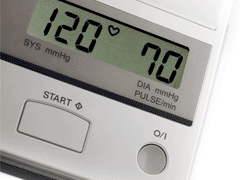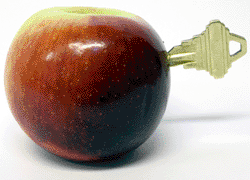|
|
Trucking to Better Health

Being on the road can make healthy living difficult. A lack of activity and restaurant dining can add up to health risk at any age. Making good choices is possible, and here are a few important tips and resources.
Making healthy fast food choices
Controlling high blood pressure
Exercising on the road
Know heart attack and stroke warning signs
Quitting smoking
Making healthy fast food choices
Stick to these simple ground rules:
Eat a variety of foods in moderate amounts.
Use less salt on your food. Carry seasonings (like Mrs. Dash) in your cab so you can add extra flavor without the extra salt.
Avoid foods labelled jumbo, giant, and super-sized. Larger portions mean more calories. Order a regular or junior portion instead.
Choose grilled or broiled sandwiches with meants like lean roast beef, turkey or chicken breast.
Request that special sauces or added dressings be left off your order, and add lots of veggies to the mix.
Skip the croissant or biscuit in favor of a bun, bread or English muffin.
Fill up at the salad bar if available, but beware of thick, creamy dressings.
When eating Mexican food, order bean burritos, soft tacos, fajitas and other items that are not fried. Chicken is better than beef, especially with the addition of lettuce, tomatoes and salsa. Limit refried beans, and go easy on cheese, sour cream, and guacamole. Watch out for fried tortilla shells! A taco salad can have more than 1,000 calories.
Pizza can be a good choice. Order thin crust pizza with veggie toppings, start with a salad, and limit yourself to one or two slices of pizza.
Avoid these traps: fat-free muffins with plenty of sugar, skinless fried chicken contains a lot of fat, Chinese food that is deep fried or high in sodium and fat.
Controlling high blood pressure
High blood pressure increases your risk of having a heart attack, stroke, or kidney disease, as well as prventing you from passing your Department of Transportation (DOT) physical. The DOT requirement for blood pressure is 140/90 mm/hg. To keep your blood pressure under control try the following tips:
Talk with your healthcare professional
Take any medications as prescribed. If you don't understand how to take the medication, ask questions.
Maintain a healthy weight
Eat in heart healthy ways: plenty of fruits and vegetables, low fat dairy products. Moderate your total fat intake.
Limit sodium to no more than 2400 mg, or about one teaspoon of salt per day.
Drink alcohol in moderation, if at all. For men, moderate use is two drinks daily, for women, one drink.
Strive to be active a minimum of 30 minutes every day, with brisk walking or cycling. Two 15 minute periods is fine if you don't have a 30-minute block of time.
Quit smoking. Smoking increases your risk of stroke, heart disease, peripheral artery disease, and several forms of cancer.
Avoid caffeine, a stimulant which can raise your blood pressure. Coffee, tea and soda all have large amounts of caffeine.
Exercising on the road
Check with your doctor before you start an exercise program if you haven't been active, or are at risk for heart disease or other chronic health problems.
Click here for exercises you can do on the road.
|

Choose activities you enjoy. If you can't find a place outdoors to walk, stash a few weights in your truck and work out in the cab.
Carry a jump rope with you. It takes up little space and can be done almost everywhere.
Make your workout a habit you do daily, or every other day.
Play music to keep you entertained as you work out.
Surround yourself with supportive people who will encourage you and keep you motivated.
Don't overdo it. Many people give up exercise after a few days because they have overworked, sore muscles.
Reward yourself for your progress, whether it is weight loss or keeping up your new habit.
Know heart attack and stroke warning signs
Coronary heart disease is America's #1 killer, and stroke is #3. Be prepared to help if these symptoms should occur in yourself or someone else.
Most important: Quickly dial 911. Every second counts in an emergency, so don't wait more than five minutes to call for help. Many people can benefit from medications and treatments unavailable in the past. For example, clotbusting drugs can stop some heart attacks or strokes in progress, if given quickly.
Heart attack warning signs
Chest discomfort. Most heart attacks start with discomfort in the center of the chest that lasts more than a few minutes, or goes away and comes back. You may feel uncomfortable pressure, squeezing, fullness or pain.
Upper body discomfort. Pain or discomfort in one or both arms, back, neck, jaw or stomach should all be alerts. Women should note that they may have different symptoms than men, such as less chest pain and more of other symptoms.
Shortness of breath, which may occur with or without chest discomfort.
Dizziness
Cold sweat
Nausea
Stroke warning signs
The American Stroke Association states these are the warning signs of stroke:
Sudden numbness or weakness of the face, arm, or leg, especially on one side of the body
Sudden confusion, trouble speaking or understanding
Sudden trouble seeing in one or both eyes
Sudden trouble walking, dizziness, loss of balance or coordination
Sudden, severe headache with no known cause
Quitting smoking
You have to make the decision to quit. Make a plan and stick to it. Tell family, friends, and co-workers about your decision to quit, and enlist their support.
Consciously consider the reasons why you want to quit, such as improving your health or spending less money on cigarettes. Plan for the challenges you will face during this process.
Chew gum or eat hard candy as new ways to cope with your cravings. Eliminate all cigarettes and tobacco products from your home, work and environment.
Talk to your doctor about your plans.
Nicotine is addictive because it calms and satisfies you. You may think you feel good while smoking, but you'll feel even better when you stop.
Source: www.freemanhealth.coì
|
|
|
Top 10 Signs You Are Ready to Be a Trucker
You are ready to be a trucker if:
- You hate fluorescent lighting.
- The sound of a time clock makes you itch.
- Your supervisor reminds you of a mosquito buzzing in your ear.
- You know all your coworkers stories by heart.
- Your commute to your job is more interesting than your job.
- You consider Ohio to be just down the road from Colorado.
- On vacations, no one gets to drive but you.
- You know four different routes to get to work, and five routes to get home.
- You installed a rear-view mirror at you workstation.
- You honk your horn at kids just for fun.
|
|